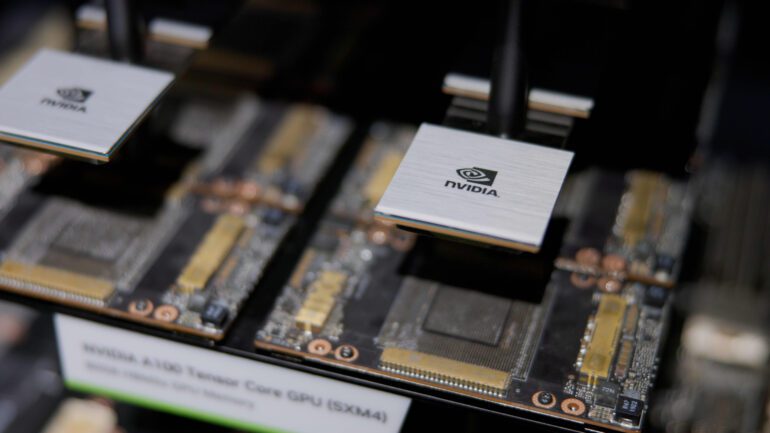TL;DR:
- Nvidia distributes samples of two new AI chips for the Chinese market amidst escalating US export regulations.
- CEO Jensen Huang emphasizes compliance with regulations and eagerness for customer feedback.
- Three chips, H20, L20, and L2, tailored for China, integrate Nvidia’s latest AI capabilities.
- Pre-orders for the H20 chip have been initiated, and pricing is competitive with Huawei’s offerings.
- Integration challenges delay H20 chip release.
- Nvidia’s China business declined due to expanded US export controls, recording $1.9 billion in sales for the fiscal fourth quarter.
Main AI News:
In a strategic maneuver to fortify its position in the Chinese market amidst escalating US export regulations, Nvidia has initiated the distribution of samples for two cutting-edge artificial intelligence chips. CEO Jensen Huang disclosed this development, emphasizing the company’s commitment to sustaining its dominance despite regulatory challenges.
“We’re currently in the sampling phase with our customers. Both chips are fully compliant with regulations and do not require a license. We eagerly await customer feedback,” Huang stated during an exclusive interview with Reuters following the release of Nvidia’s quarterly results. He underscored the company’s readiness to vie for market share, expressing optimism about its prospects in catering to the evolving demands of the Chinese market.
Although specific details regarding the chips and clientele remain undisclosed, Nvidia’s proactive stance reflects its strategic imperative to navigate through regulatory hurdles while meeting market demands. Notably, industry reports suggest the introduction of three chips—H20, L20, and L2—tailored for the Chinese market. These chips integrate Nvidia’s latest AI capabilities, albeit with modifications to adhere to new US regulations, as per analysis by industry newsletter SemiAnalysis.
Recent reports indicate that Nvidia has commenced pre-orders for the H20 chip, positioned as the flagship offering among the trio. Pricing for the H20 chip aligns competitively with counterparts, including offerings from key competitor Huawei. However, delays in the chip’s release, attributed to integration challenges faced by server manufacturers, underscore the complexities inherent in navigating market dynamics amidst regulatory constraints.
Nvidia’s business in China experienced a setback following the expansion of export control measures by Washington in October. This regulatory landscape significantly impacted the company’s performance in the region, leading to a decline in business activities. Notably, Nvidia’s sales in the Chinese market, encompassing Hong Kong, amounted to $1.9 billion for the fiscal fourth quarter, reflecting the evolving dynamics influenced by regulatory shifts.
As Nvidia navigates through the intricate terrain of regulatory compliance and market competition, its strategic initiatives underscore a concerted effort to uphold its market position and cater to the burgeoning demands of the Chinese AI landscape. With regulatory uncertainties looming, Nvidia’s agility and strategic foresight remain pivotal in navigating through turbulent waters while sustaining growth momentum in key markets.
Conclusion:
Nvidia’s proactive measures in navigating regulatory complexities while addressing market demands underscore its strategic agility. The distribution of AI chips tailored for the Chinese market reflects a commitment to sustaining competitiveness amidst evolving regulatory landscapes. However, challenges such as integration delays highlight the intricacies of operating in a regulatory-constrained environment. As Nvidia continues to navigate these challenges, its ability to adapt and innovate will be crucial in maintaining market leadership and addressing the dynamic needs of the Chinese AI market.

